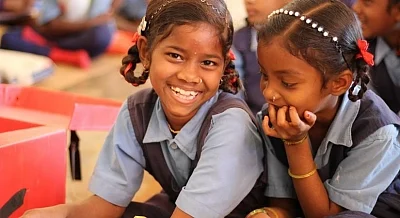A recent study conducted by National Coalition on the Education Emergency (NCEE), in three states – Karnataka, Telangana, and Tamil Nadu, – revealed that most parents said their children’s ability to read and write had declined over 18 months of COVID-enforced school closure.
The study revealed that the sustained school closure only widened the existing social and economic gaps. Those parents who could support their children’s online education felt that their children had made some academic progress, even during the pandemic, as opposed to those parents who could not.
The study was conducted in over 500 households and 900 children across 9 districts from October 2021 to January 2022. The survey captures the scale of the learning loss among school children across the country.
“It is important to recall that these testimonies are from parents in states that are relatively advanced. Multiply them by the number of parents of the 200 million or so school-aged children who have had virtually no meaningful education for close to two years.”The study by NCEE
The Learning Loss
When asked, most parents said that their children’s ability to read and write had declined. Many felt that their children have forgotten everything and are no longer interested in studying, or that they are falling behind since the pandemic began.
A greater number of parents of children in government schools said that their children’s learning had stagnated, in comparison to those in private schools.
In addition to this, parents spoke of changes in behaviour among their children, such as a lack of routine and discipline, lack of motivation or interest in education and addiction to mobile phones. Some observed that among younger children, their eating habits and hygiene were affected too.
Widened Gaps in Education
While children from all backgrounds faced learning losses, those who have a lower socio-economic status were impacted more severely. The study divided households into two socio-economic categories on the basis of employment, caste, and speaking English at home.
The study read, “the sharp differences between the higher SES group and lower SES group in this sample therefore only reinforce the fact that there is a wide gulf between the educational experiences of the elite sections of society and of the disadvantaged groups, which will further deepen inequality in education outcomes.”
A disparity was recorded when parents were questioned. Almost 90 percent of high SES children could follow online classes while around 70 percent got private tuition.
Difference in responses among socio-economic groups in Telangana can be seen in the numbers below:
Did Students Have Books and Other Forms of Support?
The study shows that in government schools in Karnataka and Telangana, less than two-thirds of children had textbooks. Meanwhile, in Tamil Nadu, this was over 80 percent. Most had at least some books if not all.
Parents were also asked if their children receive any extra support such as after-school classes, tuition, and educational programmes on TV or phones.
Private tuitions were not widespread among the children sampled in Karnataka and Tamil Nadu whereas 40 percent of the children took private tuition in Telangana.
A very small percentage of parents said their children had extra classes after hours. Percentage of students who watched educational programmes on TV ranged from 15 to 35 percent in the three states.
Marzia Ibrahim, Member, NCEE, said, “School reopening can’t be ‘business as usual’. Extensive surveys indicate that just cursory remedial classes will not cut it.”
She added that education needs to be renewed with adequate support and investment from the centre and the states.
